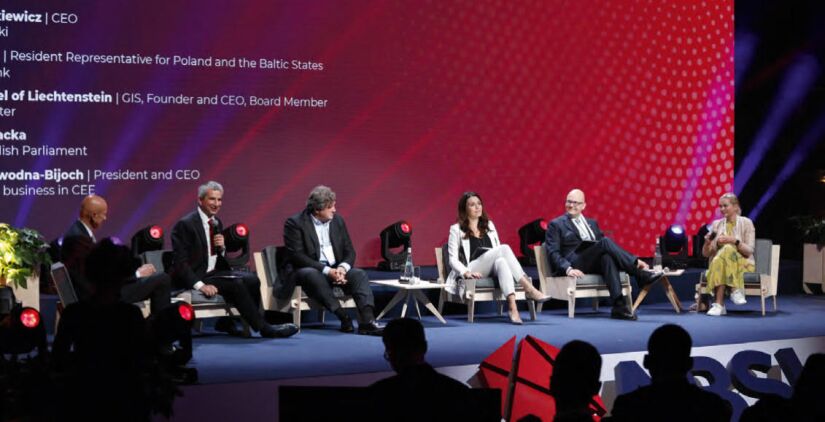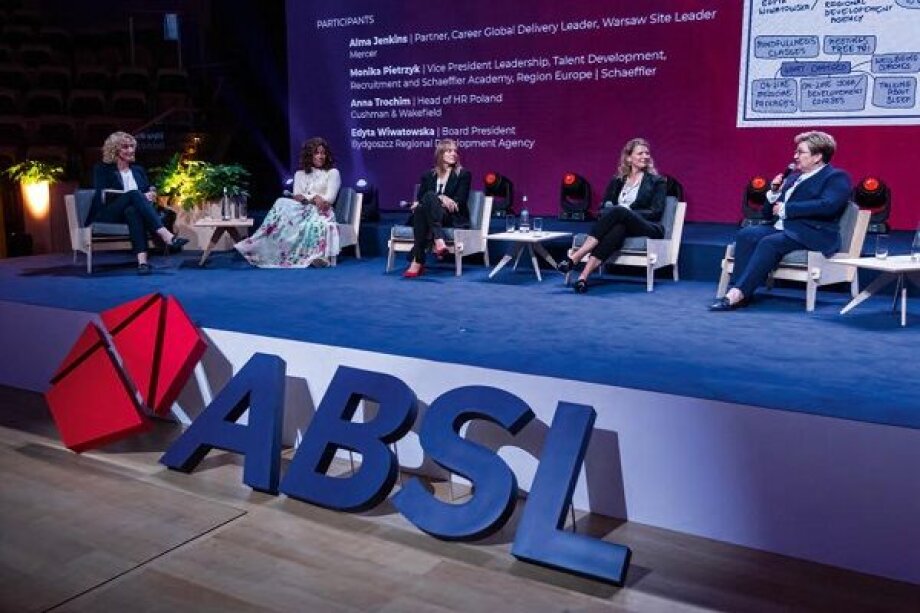WELL-BEING — THE LEITMOTIF OF ALL THE DISCUSSIONS
The world has never discussed so much about the well-being of employees, pointed out Piotr Dziwok, ABSL president. The analyses conducted by ABSL prove that the quality of life — both the well-being of employees and the environment in which we live — is playing an ever-increasing role and this is a significant challenge that businesses are facing. Topics regarding employees are part of the broad public debate. “We are observing a growing need to acquire employees with future skills but the size of the talent pool is limited. Companies are forced to compete not only in terms of salaries but also about the work environment and understanding the employee’s needs. It is clear that well-being in the broad sense requires a strategic approach,” added Dziwok.
Remote work and flexible work are generally perceived as an expected benefit, though it is important to note that this leads to a blurring of the boundaries between life and work. Managers need to help their employees embrace this new reality. Anna Trochim, head of HR Poland at Cushman & Wakefield, spoke about the importance of well-being in the panel about mental well-being as critical business input toward rebuilding a more humane workplace environment: “In the area of well-being, our focus has shifted to a comprehensive approach to this issue. Everything we do on a daily basis translates into the well-being of our employees.” On the same panel, Monika Pietrzyk, VP leadership, talent development, recruitment at Schaeffler Academy Region Europe underlined: “Safety is not enough, we need to address the psychical and emotional aspects of our well-being, and this is increasingly a challenge.”

QUALITY OF LIFE — ADDED VALUE IN ATTRACTING INVESTMENTS
Tri-City’s attractiveness is one of its greatest strengths from an investor’s perspective. This translates into the ability to attract employees from across Poland and the world. ABSL’s annual report, which includes an assessment of the factors important for running a business in individual cities in Poland, shows that Tri-City has defended its leading position in the perception of the quality of life. This has an obvious influence on new investments. Over the last five years, the largest number of jobs in the sector has been created in Tri-City (14,100), with Warsaw and Poznań taking the next places in the ranking.
From the perspective of investors, well-organized cities attracting talents have a bigger chance to draw business looking for added value. According to Katarzyna Gruszecka-Spychała, deputy mayor of the City of Gdynia: “Urban planning should be more conscious of the changing needs of all inhabitants, and therefore it should be more flexible in addressing sustainability issues. People want to be a part of something bigger.” Alan Aleksandrowicz, deputy mayor of the City of Gdańsk emphasized: “Cities have to change a lot of zoning and development plans to support communities, to ensure not only safety but also the quality of life.”
ESG – A ROADMAP FOR THE DEVELOPMENT OF CITIES
ESG factors, including environmental, social and corporate governance issues, are among the criteria determining the location of new investments, according to ABSL’s Strategic Foresight Report. Together with the Fit for 55 package and the Green Deal, ESG will set up a future roadmap for the development of cities and regions. Today’s investors expect partnerships in implementing their environmental ambitions, such as achieving climate neutrality, reducing CO2 emissions and switching to renewable energy sources. At the same time, it points to the need to implement diversity and inclusion policies in terms of social areas.
Mieczysław Struk, marshal of the Pomeranian province, said: “Sustainable development is an integral part of the Pomeranian identity.” He also stressed that the region focuses on responsible economic development with respect to the natural diversity characteristic of the Pomeranian region. This is reflected, for example, in the structure of energy generated in the region, but also in openness to other cultures, people and new solutions. “As part of our policy, we want to further support innovations that strengthen the harmony between modern business, optimal living conditions and our tradition of social solidarity,” added Struk.
During the press briefing opening ABSL Summit 2021, Wojciech Popławski, VP ABSL, emphasized that sustainable development is particularly visible at the level of access to green offices, e-mobility and the growing awareness of environmental issues. “The actions of local governments toward sustainable cities will be of key importance as the generation entering the labor market places a strong emphasis on work-life balance and ESG issues. Therefore, it is crucial to actively promote a green economy in the context of improving Poland's investment attractiveness.”

STAKEHOLDERS IN THE SPOTLIGHT
Businesses that look beyond the current event horizon and align their goals with the long-term needs of society are the most likely to create long-term sustainable value, while also driving positive outcomes for business, the economy, society and the planet as a whole. The participants saw this as a challenge, but also pointed out that the stakeholder capitalism model could serve as a solution to this growing issue. In the debate “Clash of the titans: are we ready for stakeholder capitalism?” moderated by Mateusz Szczurek, associate director and regional lead economist at the European Bank for Reconstruction and Development, the panelists talked about the shift from shareholder to stakeholder focus.
Marcus Heinz, resident representative for Poland and the Baltic States at the World Bank, emphasized that the activities of the World Bank are a perfect example of what stakeholder capitalism looks like in practice. “Investments should not only generate profits but serve communities as well — this balance should be sought after by businesses and markets,” said Heinz. Brunon Bartkiewicz, CEO of ING Bank Śląski, highlighted that in stakeholder capitalism companies must include more long-term goals and perspectives to comprehensively address their development challenges. “Businesses are only beginning to calculate and include environmental costs in their strategies,” he pointed out. Katarzyna Zawodna-Bijoch, president and CEO of Skanska office business in CEE, summarized that stakeholder capitalism is profit with a purpose, as building a more sustainable future requires more collaboration among all the stakeholders involved. She also stressed that we need to stop measuring the effectiveness of business through the lens of financial profit but rather through an environmental, social and governance prism.


















